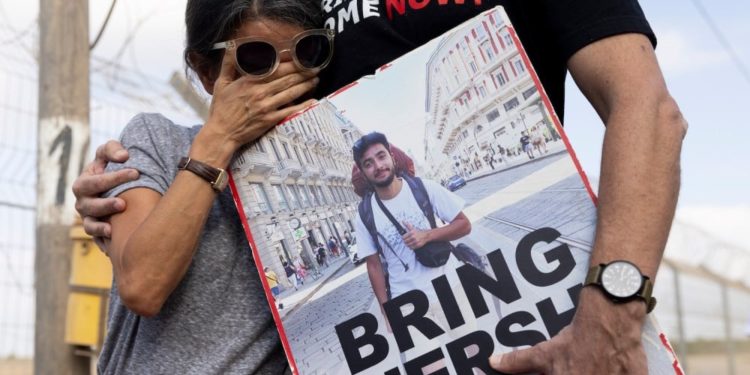As we approach the one-year mark since the horrific events of Oct. 7, 2023, it’s time to recognize that the methods attempted so far to gain the release of the remaining 101 hostages held in the Gaza Strip—including four American citizens—aren’t working. President Biden has failed to get Israel and Hamas to accept a ceasefire and a prisoner exchange despite months of prodding. Israeli rescue attempts have had only limited success. Israel said on Sunday that during a recent military operation, its troops discovered six hostages who had been killed by their captors, including Hersh Goldberg-Polin, an American Israeli who had been one of the faces of the hostage ordeal—and whose parents spoke at the Democratic National Convention last month. Goldberg-Polin and the others did not have to die.
As we approach the one-year mark since the horrific events of Oct. 7, 2023, it’s time to recognize that the methods attempted so far to gain the release of the remaining 101 hostages held in the Gaza Strip—including four American citizens—aren’t working. President Biden has failed to get Israel and Hamas to accept a ceasefire and a prisoner exchange despite months of prodding. Israeli rescue attempts have had only limited success. Israel said on Sunday that during a recent military operation, its troops discovered six hostages who had been killed by their captors, including Hersh Goldberg-Polin, an American Israeli who had been one of the faces of the hostage ordeal—and whose parents spoke at the Democratic National Convention last month. Goldberg-Polin and the others did not have to die.
Two things should be clear to anyone paying attention: First, Hamas and its senior leader in the enclave, Yahya Sinwar, are responsible for the ongoing suffering of the hostages in Gaza; and second, Israeli Prime Minister Benjamin Netanyahu has the power to secure their release but has chosen again and again not to do so.
Since December, there has been a proposal on the table to exchange hostages with Palestinian prisoners in Israeli custody at a ratio that favors Hamas. It is predicated on a cease-fire and a path to a diplomatic settlement of the war. It is the only formula that could secure the return of all hostages from Gaza.
Sinwar will not agree to changes in the basic outlines of the deal. Counter to Netanyahu’s claims, military pressure does not work on him. In warfare, it is important to understand your adversary. For Sinwar, the rising death toll in Gaza with all its attendant pain actually advances his core interest: It increases the delegitimization of Israel internationally. And while Sinwar is clearly going to great lengths to protect his own life, he would rather die than give up hostages without securing an end to the war.
Netanyahu, for his part, is not genuinely interested in a hostage deal, as it endangers his political survival. As long as there are hostages in Gaza, he has a justification to continue the war. And as long as the war continues, he can push off demands for a commission of inquiry, an early election, and a broader political reckoning. Netanyahu presided over the single largest one-day loss of civilian Jewish lives since the Holocaust, and his only way to survive politically is by perpetuating the war. While Netanyahu pays lip service to the hostages and to Biden’s efforts on their behalf, he is actively sabotaging any chance of a deal.
He has done so throughout the negotiating process by repeatedly introducing new demands. The latest example is his insistence on maintaining Israeli control of the border between Gaza and Egypt, which Israel calls the Philadelphi Corridor. Netanyahu said that holding the corridor is necessary to prevent Hamas from rearming. But Israel didn’t bother capturing Philadelphi until nine months into the war. And Israel’s own security chiefs believe it’s possible to block the flow of arms from Egypt without maintaining a troop presence there.
Netanyahu has also ordered provocative military actions at several junctures when it appeared that the negotiations might be advancing. In early January, when the three-stage hostage deal was gaining steam, Netanyahu authorized the assassination of Hamas deputy leader Saleh al-Arouri in Beirut—halting the talks. In early April, just when the United States, Egypt, and Qatar made a breakthrough on the hostage deal, an Israeli attack in northern Gaza killed three sons and four grandchildren of Hamas political chief Ismail Haniyeh. Negotiations stalled. The pattern is unmistakable.
Multiple times over the past few months, Netanyahu has committed himself to a deal in private meetings with Biden or members of his team, only to move the goal posts publicly.
This happened in May, when Biden spoke publicly about his agreement with Netanyahu, and again just last week, following Netanyahu’s three-hour meeting with U.S. Secretary of State Antony Blinken.
I’ve been involved in hostage negotiations for a long time, and so I can tell you: When there are gaps between the sides and you want negotiations to succeed, you emphasize the common ground in your public remarks. If you want the negotiations to fail, you speak publicly about the gaps. It’s hard to ignore the fact that Netanyahu only ever talks about the gaps.
From the outside, this certainly feels like an impasse. But there is another way.
Biden should set aside, for now, the effort to reach a comprehensive hostage deal and focus on bringing home the four Americans held in Gaza (four other Americans were abducted on Oct. 7 but have since been confirmed dead). He should do it quickly, before they too are killed as a result of Netanyahu’s self-serving policies. Protecting the safety of American citizens is the first order of responsibility for any U.S. president. In trying for a more limited deal, Biden would be honoring that mandate—but he might also end up breaking the impasse and nudging the sides toward a broader deal.
To put the Israeli hostages to the side for now and aim for a much smaller agreement would certainly be painful. I have maintained regular contact with the families of many of the hostages—they have endured the worst kind of suffering imaginable over the past year. As an Israeli citizen, I share their anguish—and I’m devastated by the discovery of the six dead hostages.
It would also be complicated.
The United States designates Hamas as a terrorist group and has a no-concessions policy when it comes to American hostages. Any negotiation would have to be indirect. But the current talks are already indirect—mediated by Qatar and Egypt. Building a communication channel is often the hardest part of the negotiation. In this case, it already exists.
Regarding the terms of a deal, the White House might wonder what it could offer Hamas in return for the Americans. After all, the United States cannot stop the war, nor does it have Hamas prisoners to release. This is where emotional intelligence would be key. This type of deal would not be about what the United States can offer Hamas—though humanitarian aid to Palestinians in Gaza could be included in the package. Instead, it would be about what strategic gains Hamas stands to make by doing a deal with the United States.
From Hamas’s perspective, an agreement would potentially stoke tensions between Israel and the United States—thereby advancing the group’s interests. And it would reveal Netanyahu as an obstructionist. All four Americans held in Gaza are also Israeli citizens. Their release would reflect badly on Netanyahu, underscoring that Biden was willing to do more for Israelis than their own leader.
Of course, the initiative could be framed by Biden’s political opponents as a betrayal of Israel at a sensitive moment, ahead of the U.S. presidential election in November. But the administration could make a strong case regarding its responsibility to protect the lives of U.S. citizens after almost a year of diplomacy. Or it could wait till after the election, when the lame-duck period makes the issue moot.
The most important outcome of such a deal would be the release itself—four people who have endured excruciating captivity for almost a year would be returned to their families. But an agreement—or even just the credible prospect of one—might just force Netanyahu to accept the larger hostage-deal framework.
To put it simply, it might be politically infeasible for Netanyahu to watch from the sidelines as Biden bypasses him and secures the release of hostages. The pressure from the Israeli street would be immense.
Biden has been a friend to Israel for his entire political career. A public display of tension and disagreement would be out of character for him. But a separate deal to bring home U.S. hostages would not rupture ties with Israel. Instead, it would reassert that American interests cannot be subordinated to those of a foreign power, even a close ally.
The post A Way Forward in the Israeli Hostage Crisis appeared first on Foreign Policy.



















